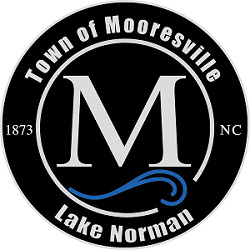
BY STACIE LETT CAIN
Despite an abundance of public comment against plans for a proposed massive data center campus, the Mooresville Town Board of Commissioners voted unanimously on Monday to schedule a public hearing for the project on September 15.
“To approve it or turn it down, we at least need to hear it,” Mayor Chris Carney said before asking commissioners to vote to set the matter for public hearing. “I don’t want to make it look like we are pushing it out past the elections. We can do it the 15th. We can do it in 2028 — whatever the board wants to do.”
Teresa Earnhardt, the widow of NASCAR legend Dale Earnhardt Sr. owns the property under consideration for the 400-plus acre Mooresville Technology Park, which would feature 1.5 million square feet in five proposed buildings. According to its established website, the project would be a master-planned data center campus providing critical infrastructure to power the internet and provide a foundation for our digital world.
The project’s developer, Tract, has asked the town to annex the property and approve a rezoning request.
Although the project’s planners promise low local impact, neighbors aren’t convinced.
Residents who packed the board meeting room raised plenty of questions about the project and commissioners during the public comment period.
“At the heart of this issue is the question of foresight and responsibility,” Kerry Pennell said. “If the city extends utilities to this area it will not end there. It will immediately become prime targets for high density development, whether industrial or sprawling subdivisions. We know that development is coming to southern Iredell County, but what this moment calls for, what the people of Mooresville are asking for, if that growth is responsible. Responsible growth that respects the land, honors the character of the area and doesn’t leapfrog ahead of the services needed to sustain it.”
Noting the secretive nature of the beginnings of this proposed development, Pennell also called on town leaders to assess the developing entity, Tract, and look at their duty to the neighbors on Patterson Farm Road.
“We would be remiss not to mention the behavior on the part of the developer,” she said. “From the beginning, their attitude has been dismissive and disrespectful — to both the residents and to the process. Their posture has been clear: Take our money or walk away. Vague promises have replaced meaningful answers. Their contempt for residents who have voiced meaningful concerns has been obvious at every single interaction. That’s not how you build trust and a future in a community like this.”
Chris Wilkinson shared that view of the project’s developer.
“Tract’s motto is speed attracts customers,” he said. “That’s their entire purpose. They cut through the red tape and your process to make sure their customers — whether it be Microsoft or Google or whatever shiny company is dangling the money — doesn’t have to sit here in the room and face us. They are not the end users. We have no idea what the real customers will demand.”
Lynn Taylor, a Mooresville resident for over 20 years, cited a 2024 ecological study from the Washington State Department of Ecology noting that the negative health consequences associated with data centers include increased incidents of asthma and cancer because of the diesel generator pollution from exhaust and nitrous oxide. Both of those pollutants are linked to lung and heart disease as well.
“In this area the health department has already acknowledged an increase in thyroid cancer, especially in teens, from the coal-driven steam plant already on the lake,” Taylor explained. “Given the health consequences of the data center, with the already elevated incident of cancer in our area, why would our board want to further risk our health? Our health should not be sacrificed for the sake off a dollar.”
In addition to the consequences of the data center itself, the board’s process for considering the project has also been scrutinized by residents.
“Patterson Farm Road is one of the last remaining areas that are truly residential. Don’t erase that with premature decisions that we all know can’t be undone,” Pennell pleaded. “For once, allow this land to be used by-right, as it is, and preserve what so many in this community value: open space, clean water, sake and manageable roads and a future that remains balanced and thoughtful. What research have you done? What questions have you asked? Why was this entire proposal discussed in back rooms far in advance of the public even knowing? Let’s be clear, this process was well in motion before residents ever caught wind of it. It is only because of the strength and unity of this community — people stepping up — that we have slowed the rush to rubberstamp this proposal. The entire mess could have been avoided with honesty and transparency from the start.
“You have a choice here. You can honor the people of this community or side with vague promises and veiled plans. Say no to this rezoning and annexation request. Let us plan first, not react later. Let us lead with integrity, not regret.”




“You have a choice here. You can honor the people of this community or side with vague promises and veiled plans. Say no to this rezoning and annexation request. Let us plan first, not react later. Let us lead with integrity, not regret.”
Have we not learned any recent obvious lessons yet or will we once again not care until it directly affects us personally?
Be there on September 15,2025.
Against the data center completely!